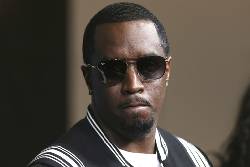NEW YORK (AP) — The jury in Sean “Diddy” Combs’ sex trafficking trial said Tuesday that it has reached a verdict on four of five counts against the hip-hop mogul. But the partial decision remained under wraps as they kept deliberating on the top charge, racketeering conspiracy.
Prosecutors, Combs’ defense team and Judge Arun Subramanian reasoned that after just two days of deliberations, it was too soon to give up on reaching a verdict on all counts. So rather than taking a partial verdict, Subramanian told the jury to continue weighing the remaining charge. Deliberations will continue Wednesday.
The developments came late Tuesday afternoon, when the jury sent a note saying it was unable to reach a unanimous verdict on the racketeering conspiracy charge because there were jurors with “unpersuadable views” on both sides.
After hearing about the note, Combs appeared morose as his lawyers explained to him what was happening. At one point, lead defense lawyer Marc Agnifilo stepped away from the huddle, returned with a piece of paper and handed it to Combs, who read it solemnly. The hip-hop mogul 's mother and several of his children returned to the courtroom.
Combs stood with his hands in pockets as jurors came into the courtroom for the judge's guidance.
“It is your duty as jurors to consult with one another and to deliberate with a view to reaching an agreement,” Subramanian told them, recapping an instruction he'd read before deliberations began.
Jurors are weighing charges that Combs used his fame, wealth and violence to force two girlfriends into drug-fueled sex marathons with male sex workers known as “freak-offs” or “hotel nights.”
He has pleaded not guilty, and his lawyers contend prosecutors are trying to criminalize Combs’ swinger lifestyle and that, if anything, his conduct amounted to domestic violence, not federal felonies.
Combs, 55, could face 15 years in prison to life behind bars if he is convicted of all charges.
Racketeering conspiracy — count 1 on the jury’s verdict sheet — is the most complicated of the charges because it requires the jury to decide not only whether he ran a “racketeering enterprise,” but also whether he was involved in committing some or all of various types of offenses, such as kidnapping and arson.
The charge falls under RICO, the Racketeer Influenced and Corrupt Organizations Act. It is best known for being used in organized crime and drug cartel cases.
Earlier Tuesday, the jury asked to review critical testimony from one of the prosecution’s most important witnesses: the hip-hop mogul's former longtime girlfriend Cassie, the R&B singer born Casandra Ventura.
The panel of eight men and four women asked for Cassie’s account of Combs beating, kicking and dragging her at a Los Angeles hotel in 2016 — an assault captured on now-infamous security camera footage.
They also asked to see Cassie’s testimony about an incident in which she said Combs accused her of taking drugs from him and kicked her off of their yacht at the Cannes Film Festival in France in 2013. On their way back to the U.S., she said, he threatened to release explicit videos of her having sex.
In addition, the jury asked for Cassie and stripper Daniel Phillip’s testimony about her jumping into his lap at a New York City hotel after. Phillip testified that he suspected Combs had been slapping and slamming her around an adjacent room.
“Her whole entire body was shaking, like she was terrified,” said Phillip, who was at the hotel for a sexual encounter with Cassie sometime between 2012 and 2014.
Phillip testified that he told her she was in real danger. Cassie, he said, “basically tried to convince me that it was OK: ‘It’s OK. I’m fine, I’ll be OK.’"
Tuesday's court session began with the lawyers and judge considering the jury's request late Monday for clarification about what qualifies as drug distribution, an aspect of the racketeering conspiracy charge.
Subramanian ultimately reminded jurors of instructions he'd already given on that part of the case.
On Monday, the panel deliberated over five hours. Barely an hour into the closed-door discussion, the foreperson sent a note complaining that there was one juror “who we are concerned cannot follow your Honor’s instructions."
The judge responded to that first note by reminding jurors of their duties to deliberate and their obligation to follow his instructions on the law.
At the trial, Combs chose not to testify as his lawyers built their arguments for acquittal mostly through lengthy cross examinations of dozens of prosecution witnesses, including former Combs employees who testified reluctantly and only after being granted immunity.
...


 Copyright © 1996 - 2025 CoreComm Internet Services, Inc. All Rights Reserved. | View our
Copyright © 1996 - 2025 CoreComm Internet Services, Inc. All Rights Reserved. | View our